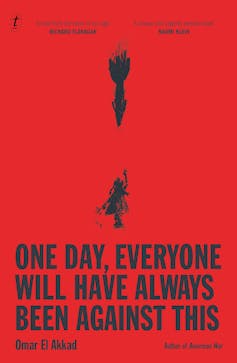‘There’s no such thing as someone else’s children’ – Omar El Akkad bears witness to the destruction of Gaza and the West’s quiet assent
- Written by Clare Corbould, Associate Professor of History and Associate Head (Research) of the School of Humanities and Social Sciences, Deakin University

Omar El Akkad does not want you to look away. An award-winning journalist and novelist, El Akkad was born in Egypt, lived as a teenager in Qatar and Canada, and migrated as an adult to the US, where he now lives with his family in the Pacific Northwest.
His essay collection, One Day, Everyone Will Have Always Been Against This, draws on his life, from childhood to new fatherhood. He combines these reflections with a sharp grasp of modern history to examine responses in the West to “the world’s first livestreamed genocide” in Gaza.
Finding that response wanting, he urges readers to watch, listen, reflect and act.
Review: One Day, Everyone Will Have Always Been Against This – Omar El Akkad (Text Publishing)
As someone whose parents migrated to the West for the freedoms and opportunities it would afford their children, El Akkad has an acute sense of the past events, ideas and structures that have shaped the present. He pays keen attention to the legacies of colonial rule.
Witnessing history
Modes of resisting
As the book’s title, which began life as a viral tweet, goes: One Day, Everyone Will Have Always Been Against This.
Bearing witness to the atrocities and the gutless responses, El Akkad reminds liberal readers that if Gaza had happened in the past, they would condemn the violence. What’s more, they would imagine that, had they been alive at the time, they would have firmly resisted the wrong or even taken a heroic stance against it.
One blistering passage will hit very close to home for Australian readers:
I read an op-ed in which a writer argues that the model for Palestinian-Israeli coexistence is something like Canada’s present-day relationship with the Indigenous population, and I marvel at the casual, obvious, but unstated corollary: that there is an Indigenous population being colonized, but that we should let this unpleasantness run its course so we can arrive at true justice in the form of land acknowledgments at every Tel Aviv poetry reading.
As well as diagnosing the problem, El Akkad surveys and evaluates modes of resisting what is happening in Gaza. He discards as ineffective the old appeal to westerners’ self-interest. Pointing out that horrors they permit elsewhere will eventually come for them just doesn’t work.
His essays were written between the Hamas attack on Israel on October 7, 2023, and August 2024, when the US presidential campaign was in full swing. Much of his energy goes to addressing the “lesser of two evils” debate about voting in a democracy where the options are far right and, at most, centre-a-bit-left. Only from a relatively protected position, he observes, could one vote for the Democratic Party on the grounds that the other side “would be so much worse”.
Making this case, El Akkad says, rests on a quiet assent to mass death. He calls this a “reticent acceptance of genocide” and asks liberals in the United States (and by implication in other western democracies) to examine their consciences.
The remedying action El Akkad proposes is widespread negation, or “walking away”. People, en masse, must refuse to accept that the meagre promises of the less conservative political parties are the best options on offer.
This will require sacrifices. El Akkad provides examples of people he admires: the writer who refused a prize from an organisation that had been silent about Gaza; the teacher brave enough to talk with teenage students about the intolerable rate of children and civilians (not “noncombatants”) dying. Most starkly, he writes of Aaron Bushnell, the US Air Force veteran, whose last words before setting himself on fire outside the Israeli embassy in Washington D.C. were “free Palestine”.
Systematic violence
Like Wells, El Akkad links systematic violence to the structures that underpin the modern world. Chief among them is capitalism. Real change, he suggests, will come when enough of us, to use the old 1960s parlance, “drop out”, though he prefers “negation”, a word that that implies there is something to defy.
It is time, he argues, for a well-educated western citizenry to say “enough”. Our phones are smart enough; we are (collectively) rich and sated enough.
It might be hard at first, but we will learn that “maybe it’s not all that much trouble to avoid ordering coffee and downloading apps and buying chocolate-flavored hummus from companies that abide slaughter”.
Doing so might just halt a genocide. In time, this kind of collective action might also stop other looming calamities, not least climate collapse. El Akkad’s steady focus throughout the book on the death, maiming and immeasurable psychic injury to the children of Gaza makes that case feel urgent.
If that sounds hyperbolic, El Akkad might ask what children you had in mind when you flinched from his diagnosis and prognosis. Your answer likely turns on the location, colour and wealth of the children you have in mind. Children in Tuvalu, for example, know he is not exaggerating.
In one of the book’s most arresting lines, El Akkad asks: “How does one finish the sentence: ‘It is unfortunate that tens of thousands of children are dead, but …’”
Better, he suggests, that we all behave in a way whose ethics is grounded in the claim: “there’s no such thing as someone else’s children.”
Omar El Akkad will be appearing at the Wheeler Centre, Melbourne, on October 22, 2025
Authors: Clare Corbould, Associate Professor of History and Associate Head (Research) of the School of Humanities and Social Sciences, Deakin University





